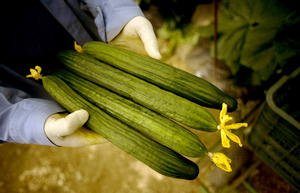

Chinese scientists have fully sequenced the genome of the new E. coli spreading throughout Europe. They announced on Saturday that they have found genes in the bacteria that gave it resistance to eight classes of antibiotics.
Pregnant women who eat high-fat diet may be more likely to have a higher rate of stillbirth, a new study suggests.
With the help of a new salinity- measurement instrument, scientists will use salt to foresee Earth's future climate, NASA said
 Hackers have again broken into Sony Corp's computer networks, this time claiming to have stolen customer data to show that the company's systems remain vulnerable to attack.
Hackers have again broken into Sony Corp's computer networks, this time claiming to have stolen customer data to show that the company's systems remain vulnerable to attack.
Sunday marks 30 years since the first AIDS cases were reported in the United States. And this anniversary brings fresh hope for something many had come to think was impossible: finding a cure.
After 30 years of AIDS prevention efforts, global leaders may now need to shift their focus to spending more on drugs used to treat the disease.
The recent outbreak of deadly E. coli in Europe was caused by an entirely new super-toxic strain, Chinese and German researchers said Thursday, after finishing sequencing its genome.
British scientists have found a new strain of the "superbug" MRSA in milk from cows and in swab samples from humans and say it cannot be detected with standard tests.
The last decade has seen a nearly 25 percent decline in new HIV infections, a reduction in AIDS-related deaths, and "unprecedented advances" in access to treatment, prevention services and care, the United Nations AIDS agency said in a report released Thursday night.
When humans see red, their reactions become both faster and more forceful, according to a new study published this week in the US bimonthly journal Emotion.
 Although German laboratory on Tuesday ruled out Spanish cucumbers as the source for spreading fatal enterohamorrhagic E. coli (EHEC) which has killed at least 16 people within Europe, the previous blame has brought a loss of 200 million euros ($287.5 million) to Spanish agriculture and farmers as nearly the whole Europe and Russia have banned the import of vegetables and fruits from Spain.
Although German laboratory on Tuesday ruled out Spanish cucumbers as the source for spreading fatal enterohamorrhagic E. coli (EHEC) which has killed at least 16 people within Europe, the previous blame has brought a loss of 200 million euros ($287.5 million) to Spanish agriculture and farmers as nearly the whole Europe and Russia have banned the import of vegetables and fruits from Spain.
Scientists have blamed Europe's worst recorded food-poisoning outbreak on a "super-toxic" strain of E. coli bacteria that may be brand new.